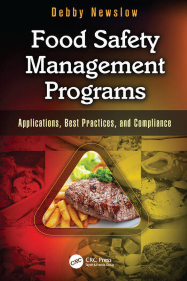Food Safety Management Programs Applications Best Practices and Compliance
Material type: TextLanguage: English Series: Food Science and TechnologyPublication details: Boca Raton, FL : CRC Press, 2016Description: XXVI, 363 p. : illISBN:
TextLanguage: English Series: Food Science and TechnologyPublication details: Boca Raton, FL : CRC Press, 2016Description: XXVI, 363 p. : illISBN: - 9781138198463
- 363.1926 NEW
| Item type | Current library | Shelving location | Call number | Copy number | Status | Date due | Barcode |
|---|---|---|---|---|---|---|---|
 Reference Collection
Reference Collection
|
Reference Section | Department of Food Engineering | 363.1926 NEW | 2022-23 | Available | 98045 |
Biography
Debby Newslow is president and executive director of D.L Newslow & Associates, Inc., located in Orlando, Florida. She is the author of The ISO 9000 Quality System: Applications in Food and Technology, released in February 2001, and the author of an HACCP-based chapter in the 2003 release of the Food Safety Compendium. Debby is an IRCA-approved auditor for ISO 9001, ISO 22000, and FSSC 22000.
Debby's main interests are assisting food, chemical, and other industries with business system development and maintenance activities. This includes ISO (9000, 14000, 18000, and 22000) compliance, HACCP, SQF, BRC, GMP, Food Hygiene, HACCP Prerequisite Programs, and Crisis Management. Debby is also an American Society of Quality (ASQ) Certified Quality Auditor, Certified HACCP Auditor, Certified Quality Manager, and a Certified Food Manager. Debby has won several awards for her knowledge, dedication, and contributions to the food industry, including the Roy Wilson Sparkle Award presented by the Florida Division of IFT for her contributions to sanitation in the citrus industry, the Bob Olsen Award for her distinguished contributions and service to Florida Section IFT, the Sanitarian of the Year Award from the Florida Association for Food Protection, and the 2013 Food Safety Leadership Award for Training presented by NSF at the May 2013 Food Safety Summit in Baltimore, Maryland.
SUMMARY:
The safety of food products is fundamental. The value of an effective and well-defined, -implemented, and -maintained management system is priceless. When it is integrated into a process, it supplies the necessary foundation and structure to help provide the consumer with a safe product of the highest quality. Food Safety Management Programs: Applications, Best Practices, and Compliance presents the insight and shared experiences that can be applied to the development, implementation, and maintenance of an effective food safety management system.
The text supplies useful tools that can be applied according to the particular needs of an operation, adding value to its processes and aiding in the establishment of a successful management-based food safety system. The author also encourages the development of a quality management system. The text begins by summarizing Global Food Safety Initiative (GFSI) food safety schemes (eight as of the writing of this text). These include FSSC 22000, Safe Quality Food Code (SQF), British Retail Consortium Global Standard for Food Safety (BRC), International Featured Standards (IFS), Global Aquaculture Alliance (GAA) Seafood Processing Standard, Global Red Meat Standard (GRMS), CanadaGAP, and PrimusGFS. It also lists websites for additional information and updates. Although this text focuses on food safety management systems (FSMS), it also includes references to ISO 9001, along with the quality requirements of some of the food safety management standards. It offers information that can be applied to whichever standard is chosen by an organization.
With insights from experts in a variety of food industry-related sectors, the text explains the requirements of the standards, methods for their integration, and the process for identifying and addressing gaps in a manner that is both compliant and beneficial for the organization. The book provides experience-based information that can be integrated into any operation, which is essential for the development of an efficient, value-added, and sustainable management system.
